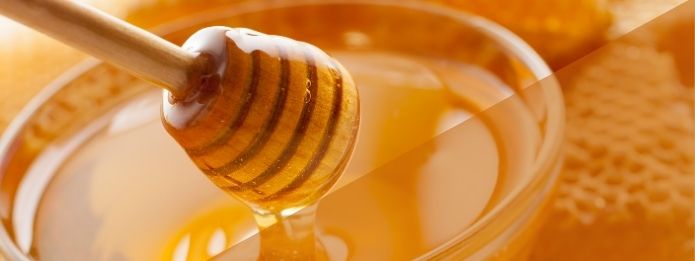
Bees may be tirelessly busy in the spring, summer and early fall months, but these relentless workers take the winter off. There are a few reasons why bees can’t make honey in the winter, so they choose to spend the cold months hibernating and waiting until the spring. Learn more about the wintertime habits of your local bee population and consider contacting us for pest control services in Kitchener.
Why Bees Don’t Make Honey in the Winter
Honey is the primary way a bee colony can survive the winter. It’s essentially stored nectar, which is what bees eat throughout the year. They take nectar from flowers in the warmer months and process it in their hives to turn it into honey.
Plants aren’t flowering in Kitchener in the winter months. As flowers fall off and plants go dormant, bees lose the raw ingredients they need to make honey. That’s why they work so hard through the spring and summer months to stock up enough honey for a long winter.
Bees that aren’t able to produce enough honey in the summer won’t survive the winter. This is why bees are always seen collecting nectar and storing up a significant amount of honey. It also explains why they can become aggressive and sting any person or animal that comes near their hive.
What Bees Do in the Winter
Instead of flying all over Kitchener and the surrounding area looking for nectar, bees go dormant and hibernate in the winter. This starts when the outdoor temperature drops to 10 degrees Celsius or lower. Honey bees form a winter cluster in the hive, with younger bees on the inside and older bees on the outside.
This cluster of bees starts shivering and vibrating to generate heat and protect their queen. This cluster, unfortunately, doesn’t include male bees, who move out of the hive and die in the winter. The queen ceases laying eggs and joins the bee cluster deep in the insulated hive.
The winter cluster needs to migrate slowly around the hive to gain access to new stores of honey. A successful hive will have plenty of honey to last the winter. Increases in temperature cause bees to become more active and go out to seek more nectar. The queen starts producing again and the entire hive surges back to life.
Bumblebees and Solitary Bees
Some bees follow a different survival approach. Bumblebees don’t create a winter cluster, so any bumblebees in Kitchener and other northern areas won’t survive the winter. This species of bees makes sure their queen is properly fed and ready to survive the winter alone. She mates and builds up fat reserves before finding a safe spot to live out the winter alone. The colony is then rebuilt every spring.
Bees that live on their own can’t generate enough heat to survive outside, so many resort to hibernating underground or looking for other warm spaces. These warm spaces can include your attic or other interior areas of your home, so it’s important to still work with our local pest control service Kitchener experts to prevent bees from entering your home and stinging you this winter.
Work With Truly Nolen for Pest Control Services in Kitchener
Bees are fascinating insects that are a vital part of our natural world, but they also pose health risks to humans. Don’t let a bee hive form in your home, and don’t attempt to move or bother a bee hive at any time of the year. Contact us at Truly Nolen Pest Control if you have bees in your home in the winter or a troublesome hive. Our expert team can help you safely move a hive without harming local honey bees.